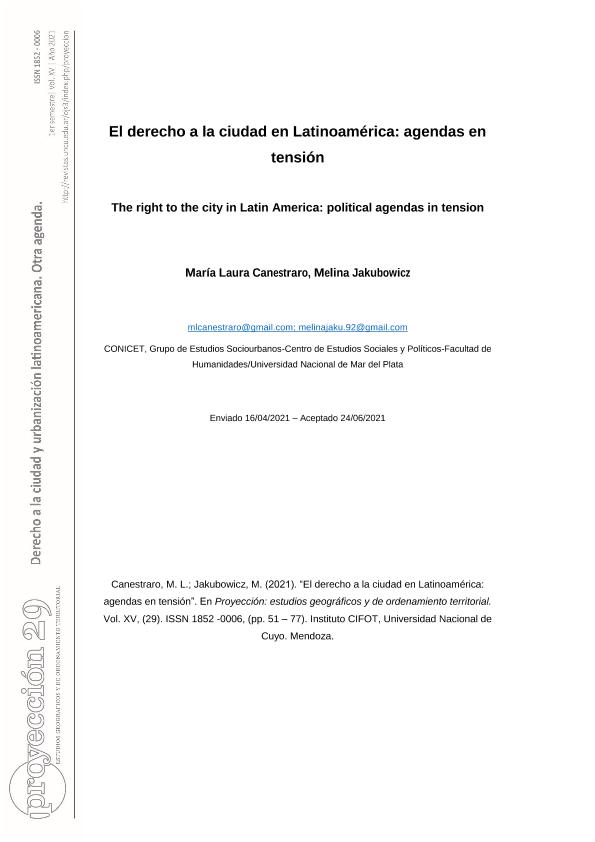Artículo
La cuestión del derecho a la ciudad, que originariamente definiera Henry Lefebvre en 1968, fue (re)visitada por numerosos cientistas sociales. Hoy resurge con énfasis tanto desde el campo académico y de los movimientos sociales como desde las políticas públicas, que recogen varios de los postulados y los (re)interpretan poniendo en tensión algunos de los ejes que vertebran la noción originaria. Emerge así un concepto ambiguo e indistintamente utilizado por agendas progresistas; yconservadoras y antidemocráticas (Pérez Ahumada; 2015).Nos proponemos recuperar algunos debates sobre el derecho a la ciudad en el contexto latinoamericano, problematizando en torno a las controversias que se generan entre sus principios subyacentes y los lineamientos generales de las agendas de organismos multilaterales que propician su efectivización en la región, concretamente en el caso de ONU-Hábitat. Partimos del concepto originario y presentamos algunas revisiones, para luego centrarnos en discusiones regionales. Seguidamente, presentamos los ejes centrales de las reuniones del mencionado organismo: HábitatI (1976), HábitatII (1996) y HábitatIII (2016), deteniéndonos en la Nueva Agenda Urbana y sus recomendaciones a los Estados miembro, para ponerlos en diálogo con algunos indicadores recientes sobre cuestiones relevantes en la garantía del derecho a la ciudad. The matter of the Right to the city, originally defined by Henry Lefebvre in 1968, has been (re) visited by many social scientists. Today, it reemerges with emphasis, not only from the academic and the social movement fields, but also from the field of policy making, that make their own reinterpretations of its postulates, creating a tension around the axles that gave shape to the original notion. Thus, a new concept emerges, one that is ambiguous and indistinctly used both by progressive and conservative anti-democratic agendas. We set ourselves to recover some of these debates regarding the right to the city within the Latin-American context, and put in question the controversies that emerge between its underlying principles and the general guidelines of the multilateral international organizations’ agendas that encourage its effective making in the region, more accurately, the case of UN-Habitat. Our starting point is the original concept; we present some of its revisions and then move on to the regional debates. Then, we present the main topics of the aforesaid organization’s meetings: Habitat I (1976), Habitat II (1996) and Habitat III (2016). We take a special interest in the New Urban Agenda and the recommendations made to the Member States, in order to start a dialogue with a few recent indicators about relevant matters to guarantee the right to the city.
El derecho a la ciudad en Latinoamérica: agendas en tensión
Título:
The right to the city in Latin America: political agendas in tension
Fecha de publicación:
07/2021
Editorial:
Universidad Nacional de Cuyo. Facultad de Filosofía y Letras. Instituto de Cartografía, Investigación y Formación para el Ordenamiento Territorial
Revista:
Proyección: estudios geográficos de ordenamiento territorial
ISSN:
1852-0006
Idioma:
Español
Tipo de recurso:
Artículo publicado
Clasificación temática:
Resumen
Palabras clave:
Derecho a la ciudad
,
Latinoamérica
,
Agendas urbanas
Archivos asociados
Licencia
Identificadores
Colecciones
Articulos(CCT - MAR DEL PLATA)
Articulos de CTRO.CIENTIFICO TECNOL.CONICET - MAR DEL PLATA
Articulos de CTRO.CIENTIFICO TECNOL.CONICET - MAR DEL PLATA
Citación
Canestraro, Maria Laura; Jakubowicz, Melina; El derecho a la ciudad en Latinoamérica: agendas en tensión; Universidad Nacional de Cuyo. Facultad de Filosofía y Letras. Instituto de Cartografía, Investigación y Formación para el Ordenamiento Territorial ; Proyección: estudios geográficos de ordenamiento territorial; 15; 29; 7-2021; 51-77
Compartir




